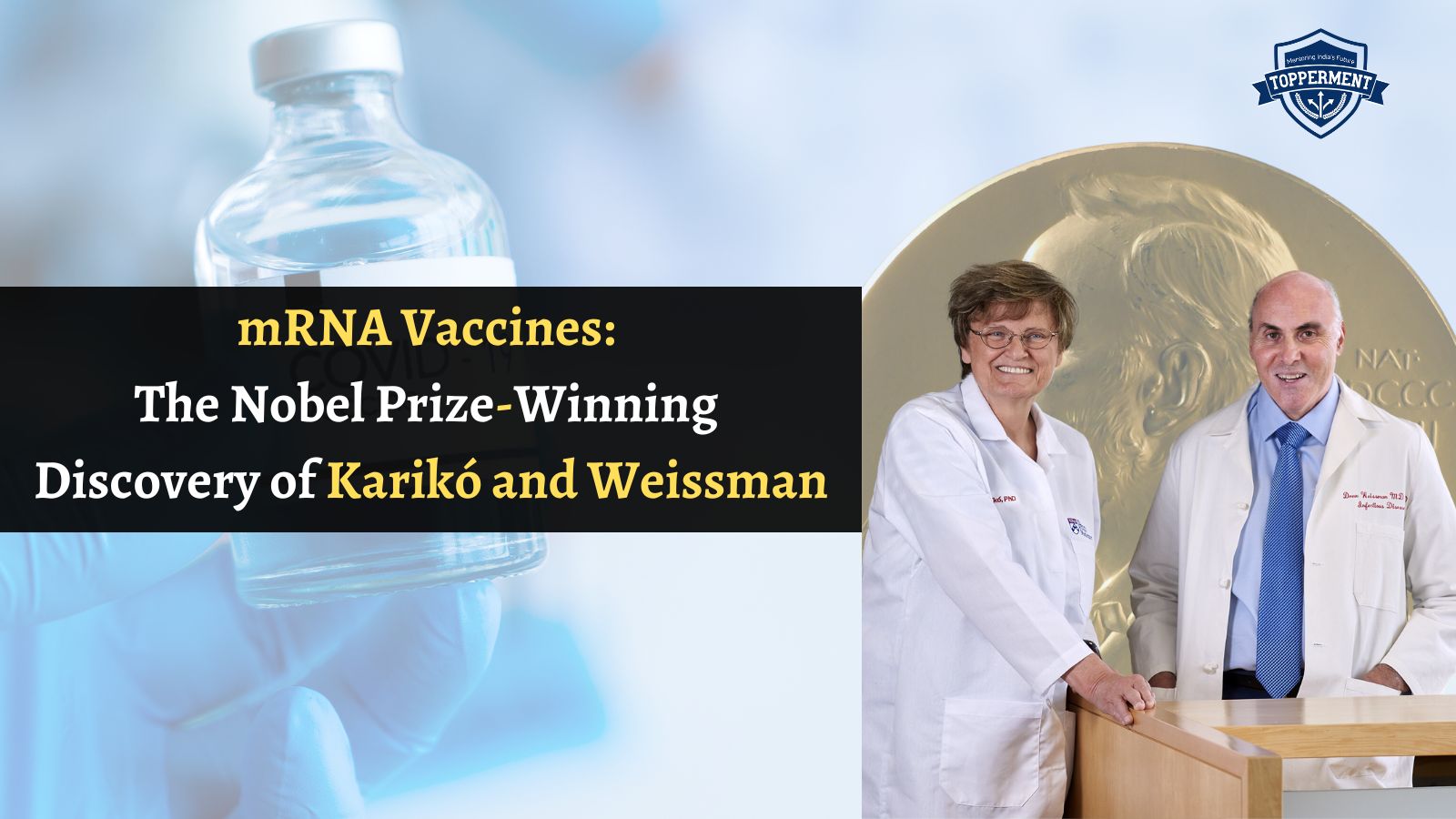
mRNA Vaccines: The Nobel Prize-Winning Discovery of Karikó and Weissman
The Nobel Prize in Physiology or Medicine 2023 was awarded jointly to Katalin Karikó and Drew Weissman “for their discoveries concerning nucleoside base modifications that enabled the development of effective mRNA vaccines against COVID-19”1 Their groundbreaking work paved the way for the development of mRNA vaccines, which have been instrumental in the global fight against the COVID-19 pandemic. But who are these two scientists, and how did they overcome the challenges and skepticism that faced their research?
Katalin Karikó: From Hungary to Pennsylvania
Katalin Karikó was born in 1955 in Szolnok, Hungary. She grew up in a small home without running water, a refrigerator, or television. Her father was a butcher, and her mother was a bookkeeper. She excelled in science during her primary education, earning third place in the country in a biology competition
She obtained a B.Sc. degree in biology in 1978 and her Ph.D. in biochemistry in 1982, both from the University of Szolnok. She was fascinated by RNA, a molecule that carries genetic information from DNA to make proteins. She wanted to explore the potential of RNA as a therapeutic tool for various diseases. However, she faced many difficulties in pursuing her research in Hungary, due to the lack of funding and resources, as well as the political oppression under the communist regime
In 1985, she decided to emigrate to the United States with her husband and two-year-old daughter, carrying only $1,200 and two suitcases. She joined Temple University as a postdoctoral fellow, where she continued her research on RNA. She later moved to the University of Pennsylvania (Penn) in 1989, where she met her future colleague and collaborator Drew Weissman
Drew Weissman: From Lexington to NIH
Drew Weissman was born in 1959 in Lexington, Massachusetts. He grew up in a Jewish-Italian family, celebrating all the Jewish holidays. He attended Lexington High School, graduating in 1977. He received his B.A. and M.A. degrees from Brandeis University in 1981, where he majored in biochemistry and enzymology. He performed his graduate work in immunology and microbiology to receive his M.D. and Ph.D. in 1987 at Boston University
He did a residency at Beth Israel Deaconess Medical Center, followed by a fellowship at the National Institutes of Health (NIH), under the supervision of Anthony Fauci, then director of the National Institute of Allergy and Infectious Diseases. He studied how HIV infects and evades the immune system, and how to develop vaccines against it
In 1997, he moved to Penn to start his laboratory to study RNA and innate immune system biology. He is now the Roberts Family Professor in Vaccine Research at Penn. He met Katalin Karikó at a photocopier, where they sympathized about the lack of funding for RNA research. At the time, Karikó had been trying RNA therapy on cerebral diseases and strokes
The breakthrough: Modifying mRNA to avoid immune response
RNA is a versatile molecule that can encode any protein that the body needs. However, it is also very fragile and prone to degradation by enzymes. Moreover, when injected into the body, RNA can trigger an unwanted immune response that causes inflammation and reduces its effectiveness as a therapy.
Karikó and Weissman had an idea: what if they could modify the RNA molecules to make them more stable and less immunogenic? They focused on changing one of the building blocks of RNA, called nucleosides, which are composed of a sugar and a base. They replaced some of the natural nucleosides with synthetic ones that had slightly different chemical structures.
They tested their modified mRNA molecules on mice and found that they were able to produce proteins without causing inflammation or toxicity. They also found that they could deliver their mRNA molecules into cells using lipid nanoparticles, tiny spheres of fat that protect the RNA from degradation and help it cross the cell membrane.
They published their results in 2005 and 2008, showing that their modified mRNA could be used to produce various proteins, such as erythropoietin (a hormone that stimulates red blood cell production), vascular endothelial growth factor (a factor that promotes blood vessel formation), and luciferase (an enzyme that produces light).
The impact: Enabling mRNA vaccines for COVID-19 and beyond
Karikó and Weissman’s discoveries opened up new possibilities for using mRNA as a platform for developing vaccines and therapies for various diseases. However, their work was not widely recognized or appreciated at first. Many scientists and funders were skeptical about the feasibility and safety of mRNA technology, and their research grants were often rejected.
Nevertheless, they persisted in their research and collaborated with other scientists and companies to advance the field of mRNA technology. Two of the companies that licensed their technology were BioNTech and Moderna, which later became the frontrunners in developing mRNA vaccines against COVID-19.
When the COVID-19 pandemic emerged in late 2019, BioNTech and Moderna were able to quickly design and produce mRNA vaccines that encoded the spike protein of the novel coronavirus. The spike protein is the part of the virus that attaches to human cells and initiates infection. By injecting the mRNA vaccine into the muscle, the cells can produce the spike protein and display it on their surface, triggering an immune response that protects against future infection.
The mRNA vaccines proved to be highly effective and safe in clinical trials, with efficacy rates of over 90%. They also showed advantages over traditional vaccines, such as faster production, easier storage and transport, and potential adaptability to new variants. The mRNA vaccines were authorized for emergency use by several regulatory agencies around the world, and millions of doses have been administered to people since late 2020.
The mRNA vaccines have been hailed as a game-changer in the global fight against the COVID-19 pandemic, saving countless lives and helping to end the public health crisis. They have also demonstrated the potential of mRNA technology for developing vaccines and therapies for other diseases, such as cancer, influenza, malaria, and HIV.
Karikó and Weissman’s work has been recognized with numerous awards, including the Lasker-DeBakey Clinical Medical Research Award, Time Magazine’s Hero of the Year 2021, and the Tang Prize Award in Biopharmaceutical Science in 2022. They received the Nobel Prize in Physiology or Medicine in 2023, along with American immunologist Drew Weissman.
The future: Continuing to explore RNA biology and innovation
Karikó and Weissman are not resting on their laurels. They continue to pursue their research interests and passions in RNA biology and innovation. Karikó left BioNTech in 2022 to devote more time to research. She is now a professor at the University of Szeged in Hungary, where she is working on developing new RNA-based therapies for neurological diseases
Weissman is still at Penn, where he is the director of the Penn Institute for RNA Innovation. He is working on improving mRNA vaccines and therapies for various diseases, as well as exploring new aspects of RNA biology, such as RNA editing and RNA interference
Karikó and Weissman are also mentors and role models for many young scientists who aspire to follow their footsteps. They have shown that perseverance, curiosity, and collaboration can lead to breakthrough discoveries that can transform medicine and benefit humanity.
Also Read
Tag:IAS, IFS, India, IPS, IRS, Medicine, Nobel Prize, Physiology, Science, Technology, UPSC, Vaccine, Vaccines



